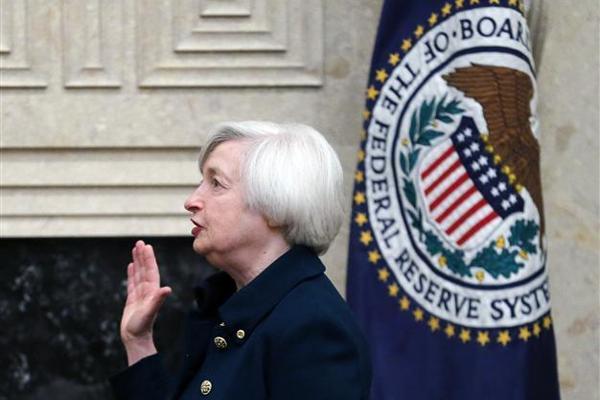Fed's new chief Yellen: No change to policy
WASHINGTON - Agence France-Presse


Federal Reserve Board Chairwoman Janet Yellen takes the oath of office as the new chair of the Federal Reserve Board of Governors at the Federal Reserve Board headquarters in Washington, Feb 3. REUTERS photo
New Federal Reserve chair Janet Yellen said Feb. 11 that she had no plans to change monetary policy from that mapped out by her predecessor Ben Bernanke.In her first comments on the U.S. central bank's path forward after the took the helm on Feb. 1, Yellen said the Fed would continue to slowly reel in its huge stimulus while keeping a close eye on the labor market, where recovery remains "far from complete." "I expect a great deal of continuity in the FOMC's approach to monetary policy," she told the Financial Services Committee of the U.S. House of Representatives, referring to the Fed's policy body, the Federal Open Market Committee.
"I served on the committee as we formulated our current policy strategy and I strongly support that strategy," she said, according to the prepared text of her testimony. The hearing is scheduled to begin at 10:00 a.m.
Yellen said the Fed expects the U.S. economy to grow at a "moderate" pace in 2014-2015, with inflation subdued and no significant danger from the turmoil in emerging markets, some of it sparked by the Fed's own policies of reducing the bond-buying stimulus program.
The recent bouts of volatility around the world "do not pose a substantial risk to the US economic outlook," she told the panel.
However, in an acknowledgement of the poor job growth numbers of the past two months that appeared to contradict the sharp fall in the unemployment rate, she stressed that the Fed still sees serious problems in the jobs market. Even at January's 6.6 percent, the unemployment rate is "still well above" the level that FOMC policymakers think would be a strong and sustainable level.
She stressed that the number of people forced to work part-time because they cannot find a full-time job "remains very high." In addition, she said, there is still a large number of people who have been jobless and looking for a job for more than six months.
In December 2012 the Fed set a reference unemployment rate for winding up its quantitative easing stimulus and beginning to tighten monetary policy overall at 6.5 percent, which it expected to be achieved only later in 2014.
But the jobless rate has fallen much faster than expected, from 7.9 percent in January 2013 to the 6.6 percent level hit last month.
At the same time, job creation has not been as strong as hoped, and in the past two months has been strikingly weak. Economists explain the divergence as representing not people getting jobs but more just dropping out of the market, and so not counted as unemployed.
Yellen's pointing to the high numbers of long-term unemployed and the high number of those with part-time work suggests the FOMC will not begin tightening, or increase its benchmark interest rate, now at 0-0.25 percent, if the 6.5 percent level is hit soon.
Crossing that threshold "will not automatically prompt an increase in the federal funds rate," she said. Instead, that would only indicate that it "had become appropriate" for the FOMC to consider whether overall economic growth would justify a rate hike.
Yellen also stressed that inflation remained tame, while suggesting there was little threat either of deflation.
Although the inflation rate has been a low one percent, far from the FOMC target of two percent, she said that the recent weakness was likely "transitory," more due to falling prices for crude oil and for non-crude imports.
